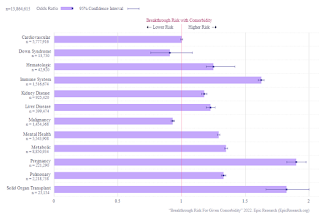COVID-19 Vaccine Effectiveness During Pregnancy
The analysis, based on Epic medical records of nearly 14 million U.S. patients since coronavirus immunization became available (Jan.2021- Jan.0222), found that pregnant people who are vaccinated have the greatest risk of developing covid among a dozen medical states, including being an organ transplant recipient and having cancer.
110,000 pregnant persons included in the study were 90% more likely to have been infected with coronavirus than the same number of people who were not pregnant. The next-highest risk was among organ transplant recipients (80%). Patients with compromised immune systems, had 60% greater odds of coronavirus infection.These findings are especially alarming since individuals who are pregnant or gave birth recently and became infected are especially prone to getting seriously ill from covid-19.
Here are a few case reports for COVID-19 illnesses before vaccines were available:
A female in her 40s with a history of subclinical hypothyroidism was admitted at 30 5/7 weeks’ gestation with a 1-week history of intermittent fever, dyspnea, and persistent dry cough. Her chest CT on admission had bilateral patchy ground-glass features, and her SARS-CoV-2 test result was positive. Within 36 hours, she reported decreased fetal movement and acutely decompensated (SaO2 50%). An emergency cesarean delivery was performed, and she was intubated after delivery with ARDS. Despite a normal echocardiogram and treatment, she died of cardiopulmonary arrest two days later (case 3 in the figure).
A female in early 30s was admitted to the ICU with a diagnosis of COVID-19 pneumonia while on 36-week gestation. She had experienced mild cold symptoms for 2 weeks before admission and reported being febrile with new onset dyspnea and dry cough on the day before admission. Her medical history was significant for type A2 gestational diabetes. She underwent cesarean delivery of a viable neonate. With persistent hypoxia (SaO2 70%), tachypnea, and impending respiratory collapse, she was intubated 24 hours later, and her antibiotic regimen was changed to vancomycin and meropenem. Over the next 5 days, her cardiopulmonary status worsened despite placement of chest tube, and despite maximal ventilator support, she died the next day (case 5 in the figure).A 35-year-old unvaccinated pregnant patient got infected with SARS-Cov-2 during the Omicron wave. The course of covid-19 was initially mild with a slight cough and general weakness. The patient's previous medical history included untreated rheumatoid arthritis and MTHFR. in the 26th week of her pregnancy. On the 26th week of her pregnancy, the patient developed bilateral viral pneumonia and bacterial superinfection presented as a lobar pneumonia with sepsis and was admitted at the hospital. After a month of ambulatory care, the person was discharged in good condition. She subsequently, at term, spontaneously gave birth to a healthy boy with a full Apgar score and normal birth weight. There were no postpartum complications.
REFERENCES
Urban MM. Těžký průběh Covid-19 u 35leté těhotné pacientky: kazuistika Difficult course of Covid-19 in a 35-year Pregnant Patient: Case Study. InSborník příspěvků ze studentské vědecké konference AWHP 2021 Aspekty práce pomáhajících profesí 2021 (p. 93).




Comments
Post a Comment